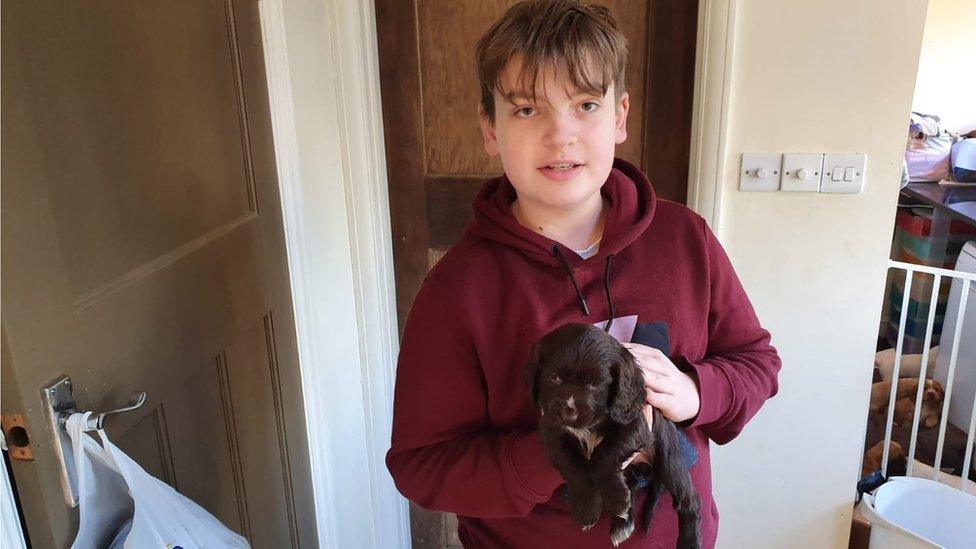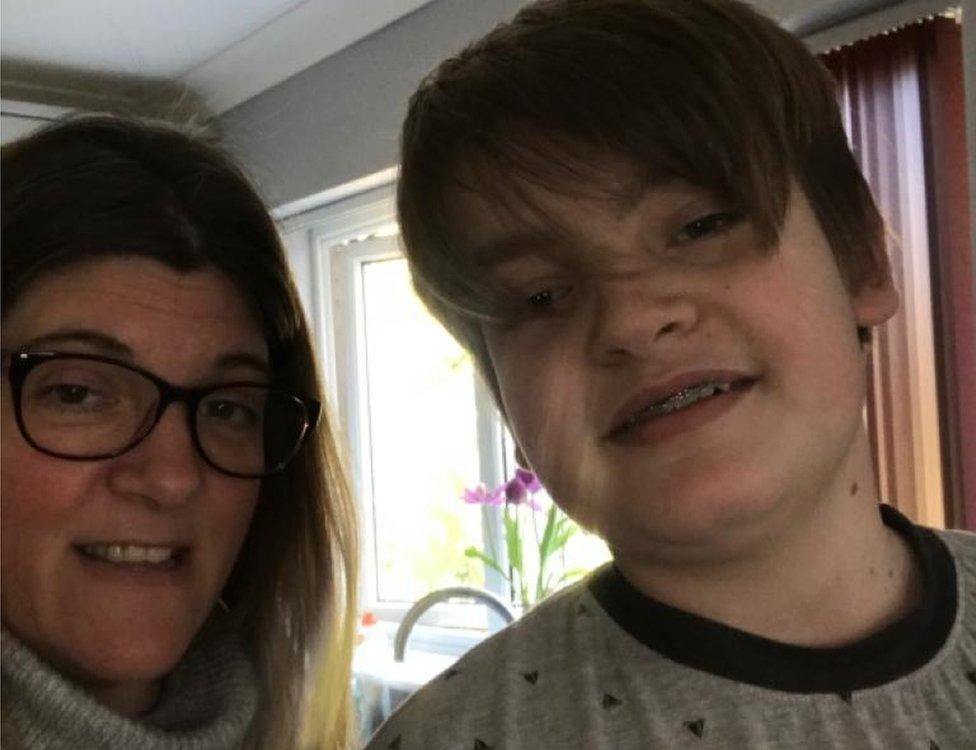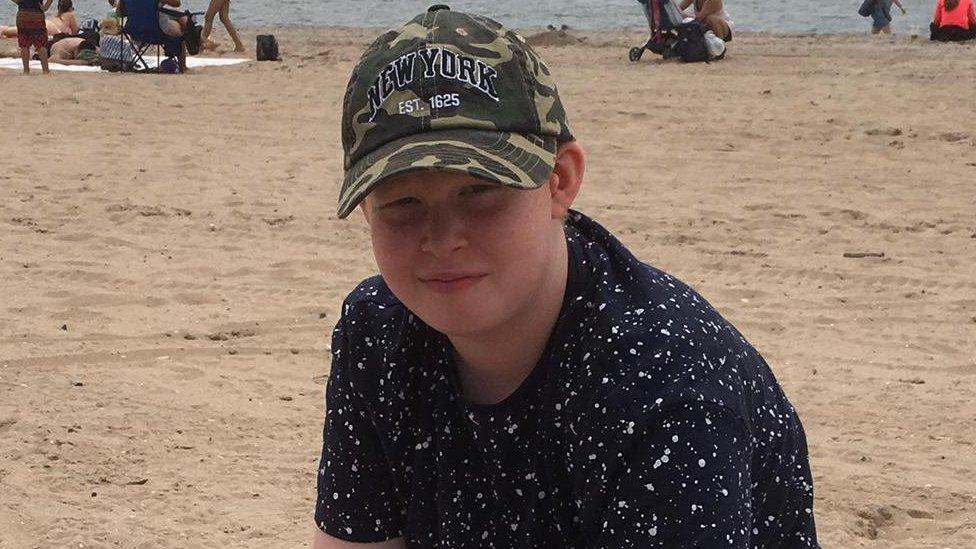Special educational needs and disabilities: The 'forgotten' children
- Published

Thomas, 13, has not been in full-time education for a year
Most children are back at school after lockdown, but some with special educational needs and disabilities (SEND) have either not returned or are at schools their parents say do not meet their needs. What is life like for these families?
When Ofsted inspectors published their report into SEND provision in Central Bedfordshire earlier this year, it did not make pretty reading.
They found systemic weaknesses, poor quality care plans and reforms that were taking too long in the service, run by Central Bedfordshire Council and the NHS.
It prompted an "extensive improvement plan", but hundreds of parents of SEND children are still not satisfied.
They have signed a petition calling for the sacking of councillors they claim have "failed to understand the depth of the crisis".
'If we were to send him to the wrong school it would break him'

Joanna says Thomas "hates school"
At the start of September, 13-year-old Thomas saw his brothers go back to school. But he did not.
Thomas has not been in full-time education since October 2019, for reasons including medication issues and exclusions.
Up to then, Thomas, who has "very complex needs", including attention deficit hyperactivity disorder (ADHD), autism spectrum disorder (ASD) and dyslexia, had been in a mainstream school.
His mother Joanna, from Leighton Buzzard, said: "Being in the wrong provision for the past four years has ruined him.
"He hates school, hates learning and he's not been given the skills or strategies to make his own way in the world, which is why we are now fighting. Every child in this country is entitled to an education."

Thomas has been offered a place at a school an hour and a half away from home
His parents have now taken out bank loans of up to £15,000 in their "fight" to get "adequate provision". They have instructed a solicitor and are taking the council to a tribunal next month.
She said they were "not alone" and had heard "some horrendous stories" from those in similar situations, including people who had remortgaged their homes.
Thomas has been offered a place in a school with an autism unit, an hour and a half away from home.
Joanna said his complex needs made it "completely unsuitable".
"I feel like we've been forgotten," she said.
"I have a 13-year-old son that has no confidence; he's got no self-esteem, no friends; he's seen his other brothers go back to school and... he told me and my husband he was depressed.
"He said he desperately wants to go to school, but if we were to send him to the wrong school it would break him."
'I'm never off the phone'

Lisa said she quit her job to concentrate on helping her son
Inspectors found major issues in Education, Health and Care Plans (EHCP) for children in Central Bedfordshire, describing them as "inconsistent and often of poor quality".
The plans are supposed to outline any special educational needs a child has, and the provision a local authority must put in place to help them.
Lisa, from Stotfold, said her 11-year-old son with ADHD and autism was in a mainstream school with an EHCP that was "extremely vague and very difficult to put into practice".
"He's gone back to school and he is refusing to do any work, breaking [coronavirus] bubbles; [has] threatened teachers and teachers' property," she said.
You might also be interested in:
While his behaviour might sound "absolutely dreadful", she said: "He's not doing it because he's an undisciplined child - he's doing it because he has no understanding of his situation.
"This is a child who is incredibly anxious about school; is frightened about being in school, who doesn't understand why things have changed and why he has to behave in a certain way in school.
"And there's nothing in his EHCP that can give him any help towards this."
The council said "a full and independent review of every EHCP is under way to ensure that our EHCP plans will be much more specific than at present".
Lisa quit her job as a school science technician in 2018 as "the stress of holding down a job and trying to fight for the help of my child was just too much".
She now spends her time attending workshops, parenting courses, and talking to the professionals helping her son.
"I'm never off the phone," she said.
"I feel for the children whose families who, for whatever reason... cannot fight this fight, because those children are missing out on support to be able to grow and develop into the people that they should be, and it's all because of the brick walls put up by the council."
'It's exhausting and stressful'

Rebecca said she had been fighting to make her son Lucas' EHCP "worth the paper it's written on"
Rebecca's 13-year-old son Lucas has a learning disability that means he is currently working to a Year One - aged five and six - level.
Depite being on the SEND register for six years, he only got an EHCP last September.
However, Rebecca, from Houghton Regis, said: "We've spent the past year fighting to actually make it worth the paper it's written on."
The plan was "not specific in any way at all - [it's] open to interpretation," she said.
"It doesn't say anyone has to do anything; it's all 'would benefit from', 'should have access to' and stuff like that.
"It's just ridiculous. You fight for so many years to get the plan in the first place and then you think everything will be better, then it isn't and you just fight again and again.
"It's exhausting and stressful."

Lucas' EHCP was "open to interpretation", said his mother
Parents have come together to form the Central Bedfordshire SEND Action Group, and a petition calls for the dismissal of the executive and deputy executive members for children's services, Conservative councillors Sue Clark and Amanda Dodwell.
Rebecca said she had signed it as she felt "frustrated".
"I just keep hearing people say 'it's going to be better', but it's just not what I'm seeing. It seems to be the same old stuff - they're just saying it's going to be better and none of it's actually happening."
'We are very sorry that they feel let down'
In response to the petition, Ms Clark said: "Amanda Dodwell and I are very aware that from the 7,500 young people in Central Bedfordshire with forms of special educational needs and disabilities, there are families who continue to have concerns about the services and support they need.
"We are very sorry that they feel let down by our service.
"Together with our NHS partners, we are working hard to deliver lasting improvements and are 100% committed to developing a service we can all be proud of.
"Improvements of this nature can take time, but we are determined to make swift and significant progress and have every intention of seeing this work through until we're giving our children and families the best possible service."

Find BBC News: East of England on Facebook, external, Instagram, external and Twitter, external. If you have a story suggestion email eastofenglandnews@bbc.co.uk
- Published1 July 2020

- Published9 June 2020

- Published26 February 2020
